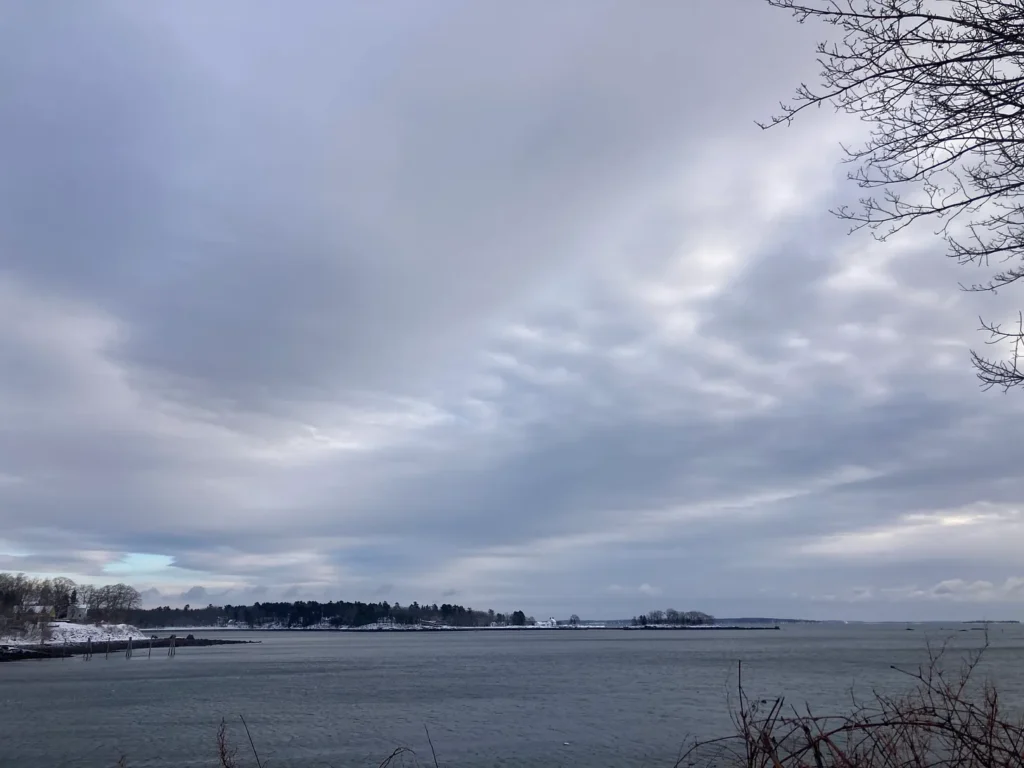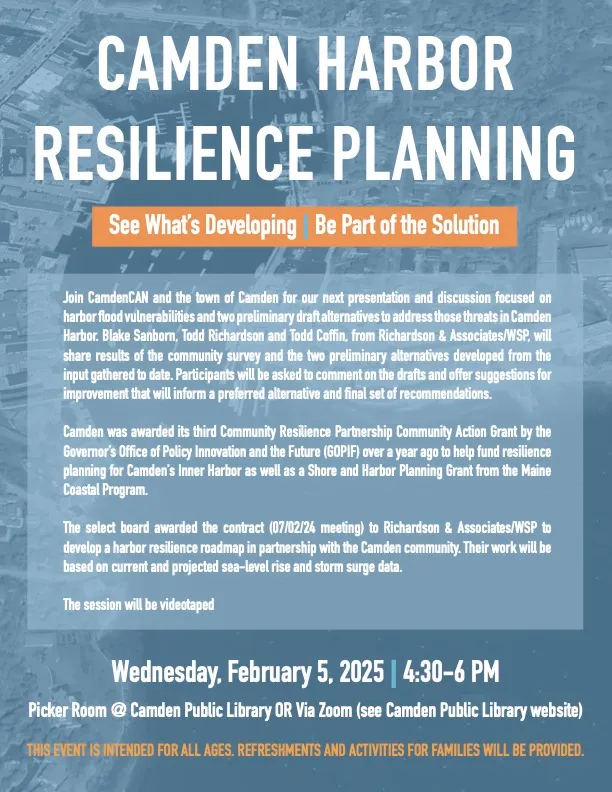
January 2025 has come in with a roar—with multiple projects and efforts to direct the future course of our village by the sea.
All around us citizens are engaged in the lively and often controversial tasks of putting forth ideas for Camden’s future. From the folks looking into the future of Curtis Island (two visioning sessions at the Camden Public Library, 2/2 and 2/18), to the Megunticook River Advisory Group (weekly on Wednesdays at 4:30, all month heading toward a proposal by 2/18/25), to a Visioning/Feedback Session on the Camden Harbor Resilience Project (2/5/25, 4:30-6 pm at CPL, see more below), folks are spending energy and resources proposing ways to transition through Camden’s challenges.
In addition, town staff has a large grant to help us envision a Ragged Mountain Recreation Area (aka Snow Bowl) able to withstand the warming of our world and the loss of winters—we hope we citizens and users will soon be invited to join the process (for a related topic see here).
Some of these challenges have to do with entropy or past neglect of infrastructure, others with the ravages of climate change and its associated challenges and opportunities.
As the saying goes, change is the only constant. (And, as the other saying goes: “There’s two things Mainers don’t like: change, and the way things are.”)
Can, and will, each of us, step up to involve ourselves in these discussions and projects so that the outcomes reflect the full richness and creativity of Camden citizens?
We hope so.
This spring CamdenCAN is offering a reading and discussion group called In Transition (see description, below), designed to engage folks in dialogues on the opportunities presented by our changing climate, and to sketch out actionable changes to help make Camden and the midcoast sustainable for 2030 and beyond. We’re also pleased to announce an evening with local filmmaker Jim Merkel on his recent project Walden’s World (see below).
Upcoming Camden Climate-Change-Related Events
1.28.25, Tuesdays, Every Other Week until April, 5-5:45 pm, Camden Public Library, CamdenCAN Reading and Discussion Group, In Transition. We’re kicking off 2025 with an inspiring screening of “In Transition 2.0,” a thought-provoking film that explores how many towns are building stronger, more connected communities. Afterward, dive deeper with our bi-monthly reading group, exploring ideas from The Permaculture City by Toby Hemenway. Together, we’ll tackle topics like creating home and community gardens, mastering water wisdom, finding energy solutions, fostering local livelihoods and wealth, embracing bioregionalism, and rethinking governance. Bring your curiosity, your ideas, and your passion for resilience—your voice will help secure our community’s future. Led by Joline Blais. Joline researches regenerative design, teaches permaculture, and advises the Terrell House Permaculture Center at UMaine.
2.5.25, Wednesday, 4:30 – 6 pm, Camden Public Library, Camden Harbor Resilience Visioning Session. Richardson Associates will share the outcomes of the survey and conversations to date and present preliminary high-level harbor visioning alternatives that provide resilience in different concept plans. They’ll seek community input on these alternatives to better understand the community’s preferences before shaping final recommendations. This interactive session will have each alternative printed in a large format so folks can comment and identify strengths and weaknesses, using stickers dots and post-it notes. They’ll break the project area into six different sections called “reaches.” Participants will be asked to comment and prioritize the resilience strategies they like best in each reach, rather than simply picking option A or option B. Refreshments and child care will be provided.
2.20.25, Thursday, 6:00 pm. Camden Public Library, Camden Talks Climate presents Saving Walden’s World, A Film About Local Resilience. Acclaimed filmmaker and Belfast resident Jim Merkel explores the urgent need for ecological balance through inspiring stories of resilience, sustainability, and hope in Slovenia, Cuba, and Kerala, India. This thought-provoking film challenges us to rethink our relationship with nature and empowers us to take meaningful action for a healthier, more harmonious world. Join us on Merkel’s journey to save not just his son Walden’s world, but our shared future. After the screening there will be a conversation with the filmmaker.
Other Local Climate-Change-Related Events
1.22.25, Wednesday, 4:30-6 pm, Brooklin School and via zoom, Maine’s Seaweed Forests: Do They Play a Role in Climate Change, Too? with Dr. Robin Hadlock Seeley. Sponsored by the Brooklin Climate Response and the Blue Hill Peninsula Rockweed Forum. See more here.
1.23.25, Thursday, 6:00 pm, Rockland Public Library, 80 Union Street. Join Maine Climate Council Coordinator Molly Siegel to learn about Maine’s climate action plan, Maine Won’t Wait. Maine Won’t Wait is the four-year climate action plan from the Maine Climate Council that puts Maine on a trajectory to decrease greenhouse gas emissions, boost renewable energy sources, and protect our natural resources, communities, and people from the effects of climate change. Learn more about the plan and how you can take action in your own life. Amalia (Molly) Siegel is the Maine Climate Council Coordinator with the Governor’s Office of Policy Innovation and the Future. For more information, email elewis@rocklandmaine.gov.
2.1.25, Saturday, 4:30 pm, Brooklin School. Brooklin Climate Response, Game Night and Potluck, including Vegetarian Chili Contest! See more here. We love the community spirit embedded in the work of this group.
2.6.25, Thursday, 6 pm. Join MOFGA for an online workshop, Gardening in Climate Change: Foundations for Garden Design in Maine’s Changing Climate. Details and registration here.
Good Reading
Maine’s Dept. of Energy has just released the Maine Energy Plan. It’s worth a read—paving the way for us to achieve 100% renewable energy by 2040. Work to be done: weatherization and consumer education about energy choices.
Copernicus Report 2024. It’s not uplifting, but it’s all the data you need to understand how much warmer this year is than last, continuing a multi-decade trend.
Thomaston Harbor Resilience Planning Report, Phase One—see what our neighbors have discovered for their harbor.
A trifecta of worthwhile newsletters: Freeport’s Kathleen Sullivan, Code Red and Me; Maine’s Jason Anthony, Field Guide to the Anthropocene; and the important insights of Timothy Snyder’s Thinking About.
Great Local Happenings…How Do We Build On These?
Thomaston to Rockport Bus Service—How Can We Get Camden Involved? How can we revive public transport that extends from Thomaston to Belfast via Rockland, Rockport and Camden?
Local solar news: rooftop solar in the Northeast is cutting daytime demand for electricity. Camden has the opportunity to buy the solar panels its now leasing (at Sagamore Farms), and build more. We’ll be continuing this pursuit in the coming weeks. Stay tuned.
Welcome to Our New Steering Committee Members
CamdenCAN welcomes two new steering committee members: Anna Dembska and Susan Wright. Are you interested in advancing climate work in the midcoast? If so, let us know by responding to this email with your interests.
Concluding Thoughts
By 2030 the world, Camden included, will have surpassed the 1.5 degree average temperature rise. Each year will likely be hotter than this year. We have observed, and are living, the reality that scientists have warned of since the 1850s: the gases we release in burning fossil fuels stay trapped within 7 miles of the earth’s surface, warming our world.
We can slow that warming only by reducing our greenhouse gas emissions: that means consuming less, burning fewer fossil fuels, using less electicity, and rethinking our relationship with our planet—coming to see Earth not as a vast resource to be consumed but rather as a complex nest of reciprocal exchanges.
The human species caused the current warming: we can still change course, but time is limited.
What else will Camden 2030 bring? We can’t know it all, but we know that if we don’t boost resilience and lessen reliance on fossil fuels, the outcomes for 2030 and beyond won’t be favorable for a healthy biosphere. Our harbor will be warmer and more acidic, we will have lost more species, lost our white winters, and paradoxically expanded but destabilized our growing seasons.
What climate emergencies will we have experienced? Forest fires? Storms wiping out infrastructure? Water shortages? Food scarcity? Sewer failures? Heat waves and droughts?
All are possible in our future. Yet so is a transformation of the systems that got us here.
The crisis calls for a reexamination of the basic assumptions of modern living.
What changes can we work for now in Camden, as caring and responsible humans, so that in 5 years we can say—look how we helped?
The potential is exciting: energy independence; a local sharing economy based on regeneration and circularity; vibrant growing of food and pollinators; more walking and shared transportation with less reliance on fossil-fuel vehicles. A network of caring neighbors sharing potlucks and sidewalk conversations.
Lives where our attention is on the rich soil underfoot, the vital air sustaining every breath, buzzing insects, dazzling acrobatic birds, and the water coursing down our streams—all given freely by mother nature. A world where we figure out how to better work with these life-enhancing systems.
A world where the here-and-now absorbs our attention. Where wealth is measured in the quality of our friendships and relationships. Where our community is rich in reciprocity and regeneration.
Join us in the discussions about how we make those critical changes!
“You never change things by fighting the existing reality.
To change something, build a new model that makes the existing model obsolete.”
—Buckminster Fuller
